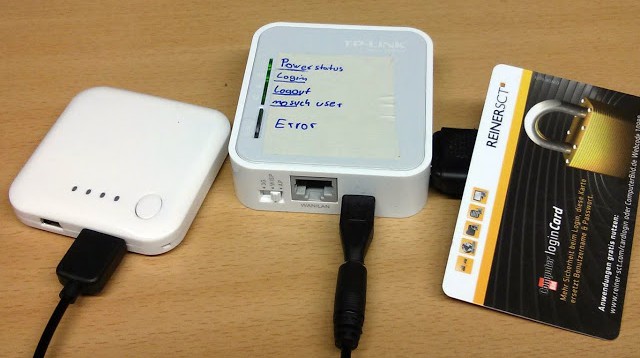Seen at the center of this image is a TP-Link TL-MR3020 which is basically a TL-WR703N wireless router with a few extra LEDs. We’ve seen a lot of projects using this hardware and that’s because it’s cheap and ripe for hacking. The devices can run OpenWRT, a Linux distro for routers that greatly extends the functionality when compared to the stock firmware. Now a couple of members of Shackspace — a hackerspace in Stuttgart, Germany — have written a script that automatically generates specialized firmware for the router. That link goes to their wiki page about the script, but you may find this overview post to be an easier read.
The concept is that gathering specialized hacks into easy to flash packages does away with a lot of configuration headaches. For example, if you just want to play around with an NFC reader for a day-long event you can connect hardware like what is seen above and use the NFC-gate option of the script to flash firmware meant to drive it. So far there’s also support for streaming a USB webcam, serving as a USB network bridge, and a few others. But the whole point of this is to make it simple to roll new firmware mods into the script that make it easy to preserve the work for use at a later time.
[Thanks Hadez]
















So… Someone wrote couple of custom profiles for stock OpenWrt Image Builder and wrapped them in scripts… OK. I thought that was default usage of Image Builder. On the other hand profiles themselves are quite nice,
I have the WR702N which only has 2mb flash. Makes me sad.
Wow, based on this HackADay, I just bought one on EBAy… but now I notice that I also have a WR702N… I wish I would have read your comment before buying!
I think you can solder there a larger flash chip.
Hi,guys.I found something interesting.It is a power bank named Sofa.
Sofa is a portable power bank specifically designed for TP-Link mini wireless router WR702N and WR703N,It is upgrade solution for users of TP-Link WR702N and WR703N.you can order it at http://igg.me/at/sofa/x/989539
steven,
REALLY? You “found something interesting?” Or you, as the “CEO” of the indiegogo team are doing a bad job of “advertising”…. I’d be a lot more interested in this device if you were not so bad at being sneaky…
Hello.
I wanted to know if anyone can help, I bought a WR703N, but by charging the firmware in English (since it came in Chinese) has been roasted, I managed to connect through the console, but this is what it says on the console :
# # Booting image at 9f020000 …
Uncompressing Kernel Image … Too big uncompressed streamLZMA ERROR 1 – must
RESET MB
LED turning on for 1s …
id read 0x100000ff
flash size 4194304, sector, count = 64
Flash: 4 MB
Using default environment
In: serial
Out: serial
Err: serial
Net: ag7240_enet_initialize …
No valid address in Flash. Using fixed address
No valid address in Flash. Using fixed address
: CFG1 0x5 0x7114 CFG2
eth0: 00:03:7 f: 09:0 b: ad
ag7240_phy_setup
eth0 up
: 0xf CFG1 0x7214 CFG2
eth1: 00:03:7 f: 09:0 b: ad
athrs26_reg_init_lan
ATHRS26: resetting s26
ATHRS26: s26 reset done
ag7240_phy_setup
eth1 up
eth0, eth1
Autobooting in 1 seconds
anyone know how to fix it
I need help
thanks
I flashed a wrong image once in my TP703N router.
Have you tried this instructions? http://forums.openpilot.org/blog/52/entry-92-unbrick-wr703n-wifi-router/
For those who are lazy to google for Dali lighting here is a video explaining it:
https://www.youtube.com/watch?v=BDS51LeF4qM
ugh .. fluorescent … so out of date